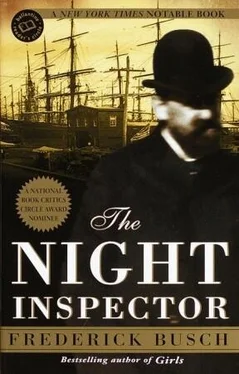“Bearskins,” he sneered. “How could I have gone for such a dream? How could you have persuaded me? How could I have permitted you to?” He put the handkerchief into his pocket, drew it out as if he’d never seen it before, addressed it as if it were a book he would read, then blew his nose, wiped his face, dried his hands, and put it away again, looking at me all the while as if I had appeared before him that very second in a nimbus of purple flame. “It’s summer,” he said. “Why did I not, simply, tell you? It’s summer . Who buys bearskins when the weather is fair?”
“Boers,” I said, and “farmers in Australia and growers in New Zealand. We invest in the world, Lapham, we are not parochial. Nor are we whiners, pouters, nor gonnifs who pike out of debts. Are we?”
He shook his head.
“Are we, Lapham?”
He took out his handkerchief, which seemed to have gone grayer in the past few minutes, and stiffer with the fruits of his physiological functions. An emptying of his left nostril only, a scrub of the forehead and cheeks, then the drying of his hands and the restoration of the handkerchief to a pocket of his vest, seemed to restore him. “I am prepared to write a certificate of obligation,” he said.
I said, “And I am prepared to come up, Lapham.” I drew, with my toe, an imagined line between us. I placed my actual toe on the imaginary line. I lifted my fists, turning sideways toward him, and bounced a few times on the balls of my feet. “I am going to administer punishment. I am about to become a nation at war. My investments must be protected, and my word as unrelenting in collection must be known as sound. You will learn about international finance. For we are nations in conflict. Are you ready for me?”
He was not. He stepped back. Looking at the street — that is, looking down, a man already beaten — he said, “And, anyway, where would I hit you? In the papier-mâché?”
I struck. I was swift and practiced, and I slapped him hard with my open left hand.
“No,” he said, stumbling. Several potbellied brokers came toward us.
I slapped him again, and he leaned against the wall of the Exchange. “Shall we meet in a week to conclude the matter, Lapham?”
He looked at the brokers who attended us. He knew them to be more concerned with debts unpaid than with the safety of a man whose face was beaten red as a sailor’s. He nodded.
“Then I declare peace,” I said, “and good day to you.”
And that is how capital works, I thought, entering 120 Broadway and climbing the iron steps. There are the weak, there are the strong, and some survive. Some, without faces, survive. Some even grow stronger. I thought of poor M, a youthful man still in his middle age, a fellow justly proud, it seemed to me, of his powerful physique. He had invested his efforts, his constructions of language, upon the national markets of England and the United States. His initial offerings were seized upon, his latter efforts were ignored. It was that simple. Surely, what had failed might be, as he had said, his best work. I knew some of the early, a little of the late, and thought him right. He had not, to me, vouchsafed an anger or resentment, even — only a quiet, beaten aspect, as of a man who knew that he was through. It wasn’t fair, perhaps, but it was true. Once famous, he was now unknown, a deputy inspector of Customs with his badge and government notebook and his locks. I wondered if he wrote his private stories in the federal book. I wondered how deep in his soul he accepted the verdict of the marketplace. The waters would roll over him, and he would be forgotten if, already, he wasn’t yet; and someone else, who wrote what the public would have — stories of investments, I thought, and who can tell? — might be remembered.
It is all rise and fall, I thought; it is all the contest waged to see who stands at the end.
As when a North Carolina platoon had broken away from Hill’s Third Corps and were moving in the direction of home. Sergeant Grafton rode up to us as we were eating squirrel in a stew, and looked at me with his abrasive blue eyes.
“So soon again?” I said.
“It is why they invented the likes of you, Mr. Bartholomew.” He nodded to Private Burton and Private Mordecai, replacements latterly detached to us, and who remained with us until my service was done. They set about to roll their blankets up and gather the water bottles to fill before we left.
I counted cartridges and caps. I cleaned the mechanism again, and I saw to the lenses of my sight and telescope.
“You haven’t asked me about our mission,” Sergeant Grafton said.
Swarthy Private Samuel Mordecai, angelic of face in a halo of hair that looked like wire brush, said, “The man shoots people. Why ask who? They’re alive, then their families are hanging blankets on the mirrors. Finished.”
Private Burton said, “What about the mirrors, Sam?”
“Dead people’s spirits don’t delay their departure if they cannot see themselves,” he said most earnestly. “Blankets. Or you could use a sheet. Anything that covers.”
“I had not thought you people to be so primitive,” Sergeant Grafton said.
“My family and I, Sergeant, have already enjoyed the advanced culture of some of you people. With the sergeant’s permission.”
Grafton laughed, and so did Burton, though Grafton seemed to sense who Mordecai was, while Burton knew mostly what he ate for supper or didn’t, and how many miles were left that day to ride.
“Where?” I asked Grafton.
“Southwest of here. Rebs breaking ranks and going home. Maybe not quite a platoon in pursuit. The colonel believes that we can harvest their morale.”
We rode hard, and it was night when I was close enough to smell their fire and their horses and the men themselves. Grafton and the lads were half a mile behind me, close enough to be endangered, and they waited warily, I knew, behind a breastwork of rotted tree limbs and earth the soldiers took turns in digging. And I, in my moccasins, with my face blackened by charcoal, took small, hesitant steps. Then I heard them, and not the pursuing party; these were the deserters. So I knew we had outrun the Rebel pursuit and were caught between the men ahead of me, disgruntled and homesick conscripts from North Carolina, according to the colonel’s intelligence, and the twenty or thirty men who had been detailed to bring them home. They might grind us between them like grain. Or the pursuers might have turned off course, thus their late arrival; if they were slightly misdirected, we might still do the business of the night and survive.
I found myself grinning in the darkness. If the Rebel maps were inaccurate, for want of reliable cartographers, I knew a reason why. Then I thought of the dog and grew sorry. But then I had to grin again. I set my finger alongside the trigger, and then I dropped very slowly and began to crawl. In a sense, it was a return to my childhood in the upstate forests. I could have roamed them blind, and I was only slightly less accomplished here in Virginia. I wondered if I should return to Grafton and warn him that we’d overshot the enemy. Only, I thought, if our mission were to live; but it was to see that Southern soldiers didn’t, and I happily crawled on through my fright, eminently containable, and through the clouds of insect, through the slimy trails of slugs.
They had tethered their horses across the little meadow from me, and they were huddled, in spite of the heat, at their cookfire. They were cold because they had crossed an unmapped boundary to which they would never return. They were cold because they wished to believe they were soon to be united with their parents or wives. They were cold because nothing now could ever come right.
Читать дальше












